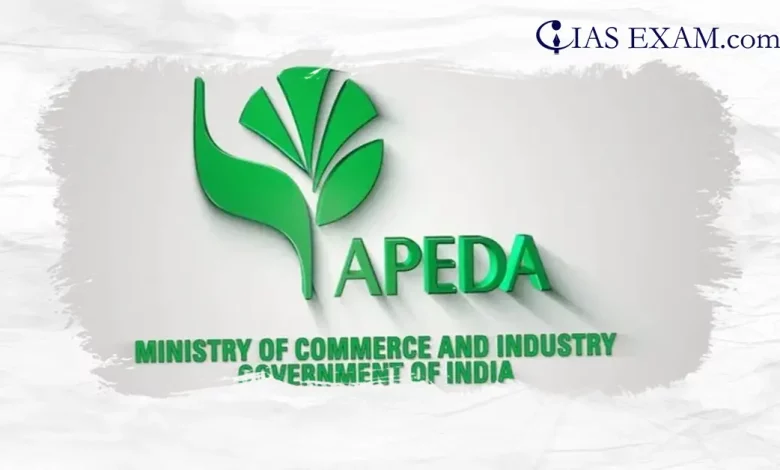Daily Current Affairs for UPSC
Dedicated Organic Promotion Division
Syllabus- Agriculture [GS Paper-3]

Context
Agricultural and Processed Food Products Export Development Authority (APEDA) has recently created a dedicated organic promotion division for the promotion of organic exports.
Organic Farming in India
- India occupies 5th place globally with a total area of 2.66 million hectares in organic farming.
- Madhya Pradesh has the largest area under organic certification observed by Maharashtra, Rajasthan, Gujarat and Karnataka.
- Sikkim is India’s first fully organic country, with enforcing organic practices on around 75,000 hectares of agricultural land.
- In 2022-23, India produced around 2.9 million metric tonnes of certified organic products like oil seeds, cereals and millets, cotton, pulses among others.
- The exports of India’s organic merchandise stood at $708 million in 2022-23 and considering the global marketplace size of around $138 billion, there is an extremely good scope to grow the organic exports in the near future.
Advantages of Organic Farming
- Healthier Food Products: Organic farming avoids the usage of synthetic fertilizer, pesticides, herbicides and many others. This results in food products which are free from harmful chemical residues with higher levels of essential vitamins.
- Enhanced Soil Health: Organic farming strategies focus on building and keeping soil health by growing organic material, microbial activity, and nutrient cycling.
- Economic Opportunities: Organic farming offers financial blessings to farmers thru premium charges for organic merchandise, get access to niche markets, and decreased input expenses over the long period.
- Climate Change Mitigation: Organic farming practices which include composting and organic soil management make a contribution to carbon sequestration in the soil, helping to mitigate climate change by lowering greenhouse gas emissions.
- Biodiversity Conservation: Organic farming practices support biodiversity by means of growing habitats for beneficial insects, birds, and other organic worlds.
Challenges in Organic Farming
- Yield Limitations: Organic farming typically yields lower outputs compared to conventional farming methods, as a minimum in the brief term.
- Weed Control: Weed management is a huge assignment in organic farming, as synthetic herbicides can not be used. Organic farmers rely on methods which include guide weeding, mulching, and cowl cropping, that is hard work-in depth and time-eating.
- Access to Organic Inputs: Organic farmers face problems in accessing licensed organic seeds, fertilizers, and different inputs, mainly in far off or underdeveloped regions.
- Certification and Compliance: Obtaining organic certification calls for adherence to strict standards and policies, that’s complex and highly-priced for farmers, particularly smallholders.
Organic Certifications Systems in India
- National Programme for Organic Production (NPOP): It is under the Ministry of Commerce and Industry for development of the export marketplace.
- It is a 3rd party certification programme where the production and coping with activities in any stages along with manufacturing, processing, trading and export requirements for organic products is protected.
- Participatory Guarantee System (PGS-India): In the operation stakeholders (such as farmers/ producers) are concerned in choice making and crucial decisions about the operation of the PGS-India certification itself through assessing, examining and verifying the production practices of every different and together declaring produce as organic.
- It is under the Ministry of Agriculture and farmers Welfare for assembling the demand of the domestic market.
- Food Safety Regulation has made it mandatory for organic products to be licensed under NPOP or PGS for being offered in the domestic marketplace under the Jaivik Bharat logo.
Government Schemes for Organic Farming
- Paramparagat Krishi Vikas Yojana (PKVY): The schemes stress on end-to-end support to farmers engaged in organic farming i.e. from production to processing, certification and advertising and put up-harvest control.
- Training and Capacity Building are fundamental parts of the scheme.
- Mission Organic Value Chain Development for North Eastern Region (MOVCDNER): The scheme is being carried out completely in the NE States to support farmers engaged in organic farming.
Way Ahead
- The shift in global consumption patterns toward healthier, safer, sustainable and nutritious food has propelled organic merchandise into the limelight.
- The surge in call for gives a golden possibility for India, to fulfill the developing global call for organic products and to tap into the global organic product market.
Source: PIB
UPSC Mains Practice Question
Q.What is organic farming? Examine the Government’s initiatives and interventions to promote organic farming in India.





.png)



